Disclosure: This page may contain affiliate links, meaning we receive a commission if you decide to make a purchase through our links, but this is at no additional cost to you. Please read our disclosure and privacy statement for more info.
Instead of asking, “When and what should I eat on night shift?”, how about “Should I eat on night shift, at all?” For most of us, the idea of forgoing food for 16+ hours may seem ridiculous, but it’s proven to help not only your waistline but also your overall health and simplify your 3rd shift lifestyle.
Avoid eating between midnight and 5 am to appease your finely tuned body clock. Eat only easily digestible snacks such as soups and smoothies if hungry. Intermittent fasting could be an effective way to simplify eating on night shift, minimizing dietary and weight issues.
As an ER nurse, intermittent fasting is a concept I am totally intrigued about. Does doing a ‘mini’ fast really work for those working the graveyard shift? Is it safe? How do I structure it to still ensure productivity during nights, lose weight and feel great? Let’s dive into answering all of these questions.
Before we jump in if you are interested in checking out the best items we use for meal prepping, click this link.
What is Intermittent Fasting?
Intermittent fasting, also known as cyclic fasting is basically not eating for a set period of time.
It’s hard to give one definitive definition because there are so many ways and structures people all around the world are using intermittent fast.
For example, Muslims participate in Ramadan where they fast for a month from dawn until sunset.
Does this tradition continue safely because it has a structure or do Muslims have some kind of superpower that allows them to last that long without food?
If we explore the structure of fasting for a second, here are a few popular ways people set up intermittent fasting:
- Eat-Stop-Eat: This involves fasting for 24 hours, once or twice a week, for example by not eating from dinner one day until dinner the next day. This is also further explained in this popular book Eat Stop Eat Book
 available via Amazon.
available via Amazon.
- The 5:2 diet: With this method, you restrict the calories you consume to only 500–600 on two non-consecutive days of the week, but eat normally the other 5 days. Yep, 500… that’s one McDonalds Big Mac for the whole day.
- The 16/8 method: Also called the Leangains protocol. The strategy here is to fast for 16 hours (this includes sleep time) and then eat for 8 hours. Basically, having lunch and dinner only, whilst skipping your snack after dinner and also breakfast the following day as well.
The 16/8 method is one of the most common, and safest methods because it doesn’t result in a reduction of muscle mass and the easiest to implement for those starting out.
It seems we actually don’t need to eat all the time, but the message has become somewhat lost among the neon, flashing lights and food advertising everywhere we look.
Benefits of Intermittent Fasting
- Promote a healthy weight (source)
- Help regulate your body’s sugar levels by stopping so many dips and spikes – even in those with diabetes. (source)
- Support a healthy inflammation response by allowing your gut to ‘have a break’ from constant digestion of foods
- Promotes your heart health by lowering your ‘bad cholesterol.’(source)
- Supports cognitive health and even may help slow or delay the onset of Alzheimers Disease.(source)
- Live longer: Animal studies show rats that have been fasting lived 36–83% longer than those which didn’t (1
 , 2
, 2 ).
).
Why haven’t I tried this as a night shift worker? Let’s read on.

Should I Eat on Night Shift?
Well, you probably don’t need to.
If:
- You stay hydrated and drink more water than you normally would
- You don’t use intermittent fasting as a way to eat rubbish. But instead stick to eating as many whole, nutrient-rich foods as possible during your ‘eating window.’
- You don’t try and do too much at once: cutting calories, physical exercise and fasting.
- You actually listen to your body and not the clock to understand what ‘real hunger’ feels like. This last one is the hardest part!
Let’s explore these points in more detail:
1. Staying Hydrated and Drinking More Water Than You Normally Would
Why?
A big chunk of the water we receive every day comes from the fruits and vegetables we eat.
For example, Oranges are packed with 88% water content whereas Strawberries are a whopping 91% water.
So if you’re not eating even these healthy, low-calorie foods which are very water dense, you need to make up this lost water by simply drinking more.
Secondly, when your body is in a fasting state as we explain in the Keto Guide for Shift Workers post, our bodies look for alternate energy sources and this results in a higher volume of damaged components and toxins in the body.
It is critical that we flush out these toxins and prevent headaches by drinking lots of water. (source)
But how much should you drink?
According to The National Academies of Science Engineering Medicine, women should enjoy 2.7 litres, or around 11 cups of water and 3.7 litres, around 15 cups, for men.
Are you close to drinking this much?
If not, I’d start here because some argue that you need to drink SO much more…
Try around 4-5L while fasting to adequately get rid of all the nasty toxins.
There are some interesting suggestions that drinking sparkling mineral water can help you feel full, which can be used as a healthy alternative. This is new to me.
Dr. Axe (an online health expert) suggests that drinking carbonated water from something like a SodaStream or purchased from the store, helps regulate your blood sugar, neutralizes your bodily acids and is a much healthier alternative to soda.
SodaStreams are incredibly popular and are a great way to save money and the environment on reducing the number of plastic bottles you purchase.
Check it out on Amazon and see if it’s right for you.
2. Don’t Use Intermittent Fasting as a Way to Eat Rubbish
If you really want to reap the rewards…
Just because you’re purposefully skipping a few meals doesn’t mean you can go crazy down the candy aisle.
The whole point of intermittent fasting is for your body to start using a different fuel source, in fats rather than glucose or sugar.
If you keep feeding your body sugar, junk food and fatty night shift snacks, your body can never burn off the glucose or sugar to really start burning that unwanted fat. Which is the dream, right?
Once all the sugar (glycogen) stores have been used up, your body needs an alternative for energy supply; such as fat cells, which it then breaks down to help fuel your body – even on night shift.
Stick to a diet full of color and healthy whole foods which are located mainly in the outside aisles of the grocery store. You don’t need to count or restrict your calories anymore.
Here are some posts you may find beneficial for ideas on what to eat during the ‘eating window:’
- Breakfast ideas: 6 Quick and Healthy Night Shift Breakfast Meal Ideas
- Green Juice: Organifi Green Juice Review – What Nobody Tells You
- Weight loss foods: 15 Best Foods for Weight Loss on Night Shift
- Avoid weight gain: Does Shift Work Make You Fat? 14 Tips To Avoid Weight Gain
3. Don’t Try and Do Too Much at Once: Cutting Calories, Physical Exercise and Fasting
So you’re starting this new intermittent fasting thing to lose weight right?
Just be careful continuing to do the things which applied to a previous diet.
Cutting calories (well, maybe later on), counting points or weighing food during your ‘eating window’ is a thing of the past.
Being a gym nut and exercising multiple times a day is also not necessary and could be unsafe if not hydrated enough.
Yes, your body does get a kick from being physically stressed, but just take it easy while your body is adjusting to being put into a fasting state, particularly starting out.
Exercise Tips While Fasting…
Light walks, a lighter gym session, yoga and pilates are great places to start for beginners when intermittent fasting.
If you’re keen to still train, this study concluded that people who used the 16/8 method we spoke about earlier, in conjunction with resistance training, ‘could improve some health-related biomarkers, decrease fat mass and maintain muscle mass.‘(1).
So it is possible, but you need to know what you’re doing.
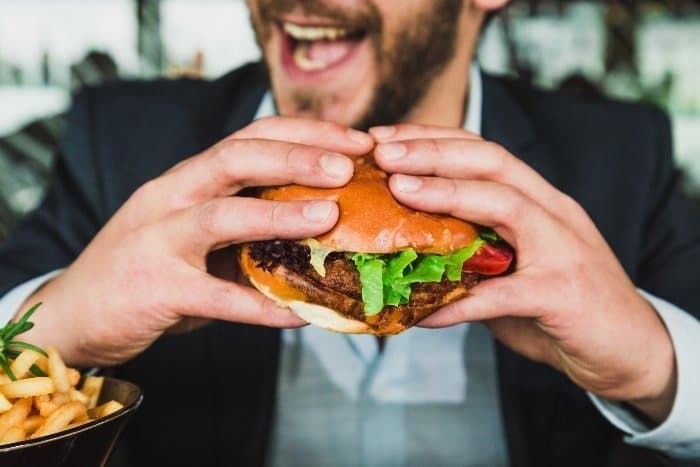
4. You Must Listen to Your Body and Not the Clock to Understand What ‘Real Hunger’ Feels Like
I am guilty of judging what I eat based on the clock. Dan tells me off all the time about it. Yeah, I know I’ve got work to do…
Intermittent fasting is based on how you are actually feeling and if you need to eat rather than simply wanting to eat… because that’s what you’re used to doing.
In the beginning, you may feel super hungry, because you’ve upset you hunger hormone ghrelin. And it’s going nuts thinking you’re heading into starvation mode… which of course you’re not.
These hungry pains and intense feelings to eat normally subsided in the first 2-3 fast periods you do and your body adjusts nicely.
[VIDEO] – This is a super interesting TED Talk I found about intermittent fasting. It’s from the perspective of a nurse practitioner and nutritionist. It’s well worth a watch.
Is Intermittent Fasting Unsafe?
No, it’s no unsafe but may be inappropriate for some groups or individuals. Seek medical advice before you fast, if you have any of the following health concerns or situations:
- If you suffer from low blood sugar or have issues with blood regulation
- If you have a history of eating disorders
- You’re pregnant or breastfeeding
- You’re underweight
- If you have issues with your gall bladder and or thyroid
- You’re currently unwell. Your body may need those vital nutrients to heal, grow new healthy cells and tissues to get better.
Women, Night Shift and Intermittent Fasting…
For some women, intermittent fasting can cause our hormones to go crazy, particularly if we under eat and don’t consume enough calories.
Females bodies are super sensitive to that ‘starvation state’ and will naturally increase the production leptin and ghrelin, our hunger hormones.
our hunger hormones.
Fasting can also, play funny games with our periods due to sensing a hormonal imbalance.
The solution? It’s called the crescendo fasting method and basically means to only fast for a couple of days week, or even ONE day a week – definitely not every day!
Related Post For Women:
- Does Shift Work Affect Your Period? Tips For Staying Regular
- Shift Work While Pregnant: Survival Tips From 46 Busy Moms
- 8 Survival Tips For Single Shift Working Parents
But Don’t I Enter a State of ‘Starvation? When Fasting?
You may hear some health professionals state things like, “fasting is the same as starving yourself, and I never consider starving a good behavior to adapt to unless you have no food to eat.”
However, ‘to enter starvation mode’ actually takes a long time. I’m talking about days…
Therefore, this shouldn’t be a reason to not try intermittent fasting.
My takeaway is that skipping meals at random can be dangerous because your body becomes used to a particular routine and glucose hit.
But skipping meals as part of a structured approach, such as intermittent fasting is completely safe.

And “Won’t Intermittent Fasting Cause Muscle Loss?”
What struck me as interesting but also sort of obvious, is that any diet without exercise will (should) result in weight loss of both fat and lean mass, with the latter being everything besides fat, including muscle.
So if you don’t exercise, even a little bit while fasting, we can lose muscle mass.
When it comes to intermittent fasting, the popular, well-researched answer is no, intermittent fasting does not result in loss of muscle mass.
Some say that during times of fasting, our bodies are actually really good at preserving muscle.
It takes hours for the body to process the protein we eat during the 8-hour time slot.
This was supported by a study done in 2016 which tested the 16/8 method on healthy 20 something-year-old males who had been weight lifting for about 5 years.
The results showed that those males who went through intermittent fasting experienced no decrease in muscle mass.
It seems there is actually no difference to our bodies if we consume protein in a smaller period of time compared to eating over the course of the day.
But how much protein should we actually be eating? I found a great book that is very reasonably priced by Brad Pilon, an expert on intermittent fasting called, “How much protein” which is worth checking out here.
Also, if you do want to keep a tight record of your progress while at the gym or using your home workout equipment, consider buying Fat Caliper to really measure your progress.
to really measure your progress.

Weight Loss, Night Shift and Intermittent Fasting
A lot of the research and blogs you read online about intermittent fasting is for people working day shift, not night shift.
The big difference is that during the night, or our day time, everything in our bodies slows down or changes.
Our metabolism and the way our body processes foods are all on the go-slow leading to disruptions in our circadian rhythm, which is associated with an increased risk of obesity, diabetes and cardiovascular disease.
I hate talking about this stuff, but we have to face the honest facts.
Read – Is Night Shift Bad for You? 11 Truths Uncovered
What’s incredible about intermittent fasting for night shift workers, is that we are giving the body what it wants, in one respect anyway, by not eating within the night time hours (if you choose this timing).
Simply by fasting through this period, your body can rest as it normally would when we are asleep.
I know we are still confusing our body clock due to the whole sleeping thing not actually happening, but at least we can cut out the eating and know we can still survive…
Related posts around food timing:
- Best practices: 9 Shift Work Best Practices You’re Probably Not Doing
- When to eat: When Should I Eat on Night Shift?
- Night shift tips: 7 Essential Night Shift Tips: Making The Impossible A Reality
How Much Food Should I Eat During the Fasting Window?
Simple. What are your health goals and eat those!
In the beginning, it’s recommended to eat a ‘normal’ sized meal and see what happens.
If you’re aiming for weight loss and you see results on the scales, stick with it, it’s working! If you’re not impressed by the weight loss, cut back on a few calories.
Be careful though not to go too severe as your body is relying on a different fuel source now. Fats. So you don’t want to feel fatigued due to not enough calories.
Have fun experimenting with what’s working. In the beginning, bring in a few extra almonds or carrot sticks to work (when you should be fasting) if your feeling horrible, instead of using the vending machine or ordering take out.

What’s Holding You Back From Intermittent Fasting on Night Shift?
For Dan and I, it’s psychological by far.
But what I keep reminding myself is that this IS NOT A DIET but more a lifestyle change.
I know that sounds cheesy and almost like an infomercial you watch on your break on the graveyard shift, but it’s true.
Tim Ferris mentioned something that had a light bulb effect on me.
“Diets are easy in the contemplation, difficult in the execution. Intermittent Fasting (IF) is just the opposite – it’s difficult in the contemplation but easy in the execution.”
Tim Ferris (source)
Mind – Blow!
I need to take my own medicine here and say, don’t worry what your friends, family and colleagues think.
Just because you’re not eating doesn’t mean you can’t sit down and chat with a fresh brew of herbal tea instead.
Related: Working 2nd Shift With a Family: How to Remain a Solid Unit
How to Do Intermittent Fasting While Working the Night Shift?
It’s recommended to have your ‘eating window’ in daylight hours to be in sync with your bodies natural process, but I know that doesn’t always work, if ever, as we’re usually asleep ya’ll!
If this intermittent fasting idea is totally new, start only fasting 1-2 days per week with each one lasting 12-14 hours. No more.
Once you are comfortable with this routine, add a day and maybe increase the fasting time to 14 – 16 hours. Don’t rush or compare yourself to others, it may take you longer to adjust and that’s okay.
Here are a few different night shift eating schedules using intermittent fasting you could try using the 16/8 method. Remember this means fasting for 16 hours and eating for 8.
Feel free to make changes depending on your shift start and finishing times.
But just remember, if you can have your eating window while it’s light for at least part of the time, this is perfect.
Example 1: Night Shift Eating Schedule Using Intermittent Fasting
5 pm – Wake up and start eating window
7 pm – Enjoy dinner with your family or friends
1 am – Eating window stops
1 am – 5 pm – Fast
Example 2: Night Shift Eating Schedule Using Intermittent Fasting
12 am – 2 am – Start of ‘eating window’ (or start at first break)
8 am – 10 am – Finish ‘eating window’
8 am – 5 pm – Sleeping and fasting
5 pm – 12 am – (the following day) – skip ‘breakfast’ and continue fasting
12 am – 1 am – Start of ‘eating window’
Example 3: Night Shift Eating Schedule Using Intermittent Fasting
7 pm – Start of ‘eating window’ (after you’ve been the gym/walk/done a few jobs)
3 am – Finish eating window (make sure you have had your break)
7 am – 8 am – Finish work, skip breakfast (but enjoy a green or chamomile tea), shower and go to bed.
7 pm – Again, start of ‘eating window’ (enjoy a meal with your family or friends)
With all of these scenarios you need to think about a couple of things:
- When will I enjoy a meal with my family? Is it breakfast or dinner?
- Fast when it’s convenient. Eat a meal before you go to work, drink only tea and coffee while at work, skip breakfast once you finish work and hit-the-hay…
- What works in sync with what you’re already doing? Are you a breakfast person? Do you like to have a big meal before work?
- Just because you’re not eating, doesn’t mean you cannot be social. Consider simply having a cup of tea and sitting with your family while they eat. The temptation to eat is obviously huge but it’s not impossible if you want it bad enough.
- Don’t get caught up in the numbers. 16 hours seems to be where the magic happens and maybe aim for this but don’t stress if your window is a tad shorter.
If you want to give this thing a shot, I love this quote from Nerd Fitness when trying to figure out your fasting period, “maximum efficiency and minimal discomfort”

What to Remember When Considering Intermittent Fasting on Night Shift
Stress Less!
If you want to eat breakfast one day because your mate from interstate is over or you simply feel like it, that’s okay. Your body is pretty amazing at adapting to different changes.
If you’re an Olympic athlete it may be a different story but chill out if you change things up a bit.
Drink More Water Than Usual
Drink Only Zero-Calorie Drinks Like Herbal Tea and Black Coffee During Fasting Periods
If you need milk or cream in your coffee to survive, I’m not going to stop you, but you might be surprised the changes in your taste buds and waistline after changing these habits.
Related: What Should I Drink on Night Shift? 10 Energy Boosting Beverages
Stay Busy
If you’re bored overnight, the lights are off and there is nobody around, you’re likely to think about food right?
Stay busy using some suggestions we give here – 9 Myths About Night Shift Jobs You Probably Still Believe.
Don’t Cut Calories Out Straight Away
If you are new to intermittent fasting…Small steps.
Bring a Jacket
Seems silly but you know how we get chills on night shift around 2-5 am when our body is preparing for sleep? Well, fasting can also cause chills too.
Why? Because fasting increases the blood flow to our fat, vasoconstriction happens in your fingertips and sometimes toes to compensate.
Listen to Your Body
Not to the clock, when thinking about food. If you’re working out and feeling dizzy, drink more water and make sure you’re eating more fats and protein during your ‘eating window.’
While talking about not getting sick, we recently published titled, “How to Work Night Shift, Stay Healthy and Not Get Sick” which is full of easy to implement strategies which have saved my butt on numerous occasions!
Sleep
Make sure you are giving your body the best chance to rest and restore through sleep. Using quality sleeping aids by checking out our favorites here and stick to a routine.
We also strongly recommended wearing blue light blocking glasses before bed to help you sleep. They allow you to still wind down for bed using your device, but they limit eye strain, allowing your sleep hormone to actually do their job.
We wear “Swannies” from Swanwick Sleep and we could recommend them highly enough. See their website here.
Is it right for you?
Seek medical advice if you ticked any of the boxes we discussed earlier.
Do I Need Supplements to Do Intermittent Fasting?
No, you don’t, but Dr. Ax, an online health expert recommends KetoFIRE Capsules for a better, boosted experience.
for a better, boosted experience.
These capsules promote healthy energy levels, fight food cravings and boost brain performance. Check it out on Amazon.
Helpful Fasting Resources:
If you need more information about intermittent fasting, you will find the following best-selling books very useful.
The reviews for both of these books are pretty mind-blowing and worth checking out.
- The Complete Guide to Fasting
 (Amazon link)
(Amazon link) - The Diabetes Code: Prevent and Reverse Type 2 Diabetes Naturally
 (Amazon link)
(Amazon link) - EAT Stop EAT (Amazon link) *this kind of intermittent fasting plan involves a 24-hour fast once or twice per week.
Cost-Effective Intermittent Fasting Courses
Do you want to learn more about intermittent fasting? Click on each of the links below to explore more
Next…
- Nausea: What Causes Night Shift Nausea And How To Finally Beat It
- Prepare for night shift: How to Best Prepare for Night Shift and Stay Healthy
- Stay fit: How To Stay Fit While Working Nights: 12 Sneaky Tips
- Meal prep: 12 Valuable Meal Prep Tips For Busy Shift Workers
Summary: Should I Eat on Night Shift? Why Intermittent Fasting Works
Does intermittent fasting guarantee weight loss? Well, nothing in this world is a guarantee… but there is incredible evidence pointing to lower numbers on your scales.
If you overcome the psychological elements and occasional social judgment from others while on night shift, intermittent fasting will simplify your life.
An increased likelihood of weight loss, improved heart and brain health are just some of the benefits to get excited about.
We hope you enjoyed this read about intermittent fasting while on night shift. Have you tried this fasting method? How did it go? What other strategies did you use?
Cheers,

Disclosure: This page may contain affiliate links, meaning we receive a commission if you decide to make a purchase through our links, but this is at no additional cost to you. Please read our disclosure and privacy statement for more info.

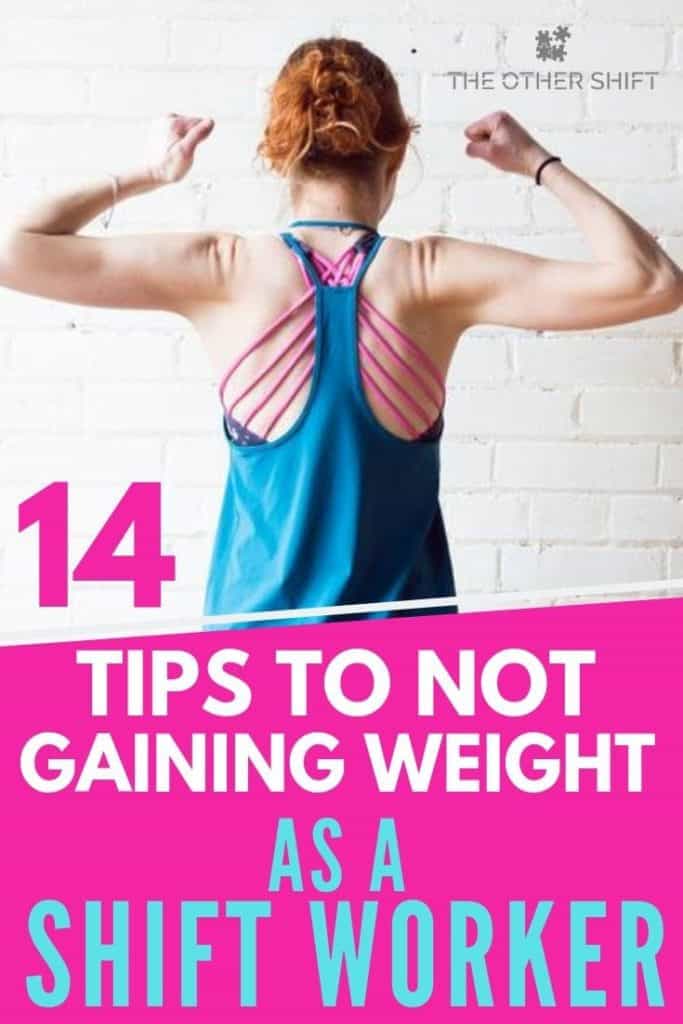
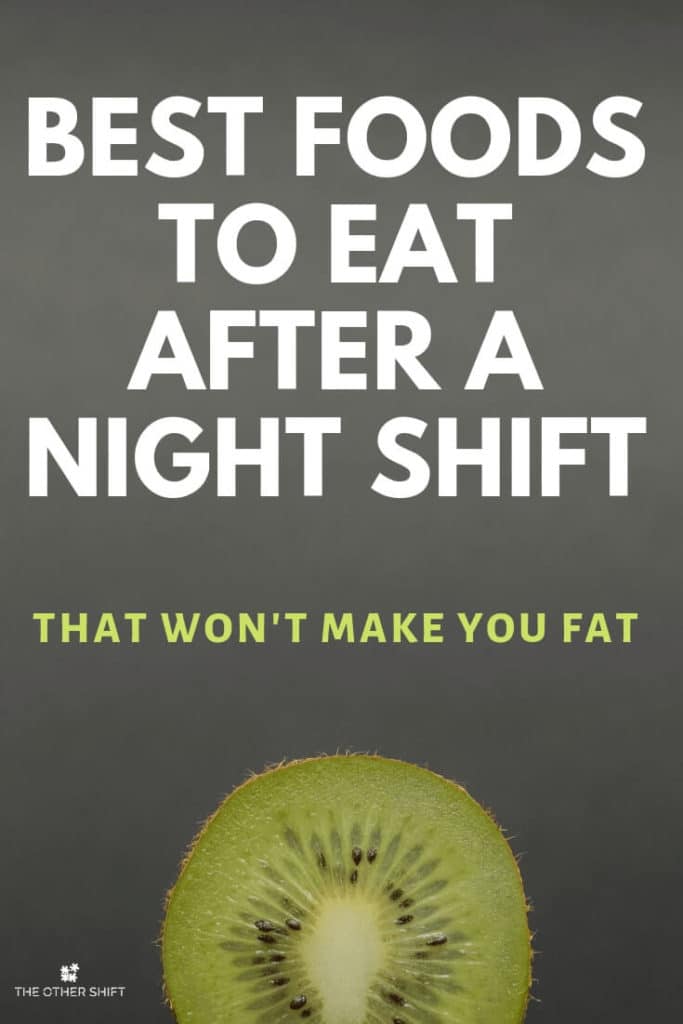

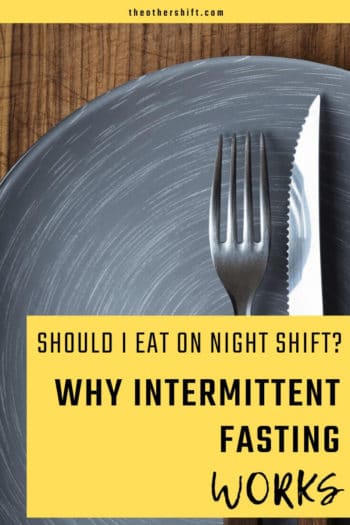
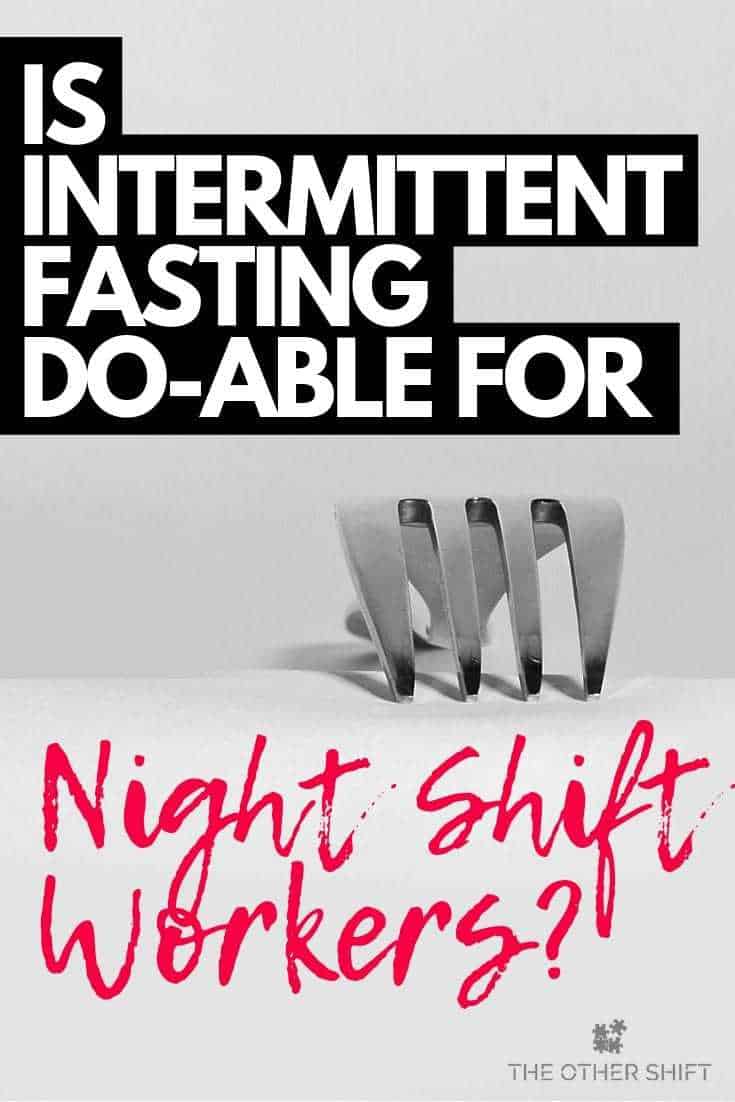
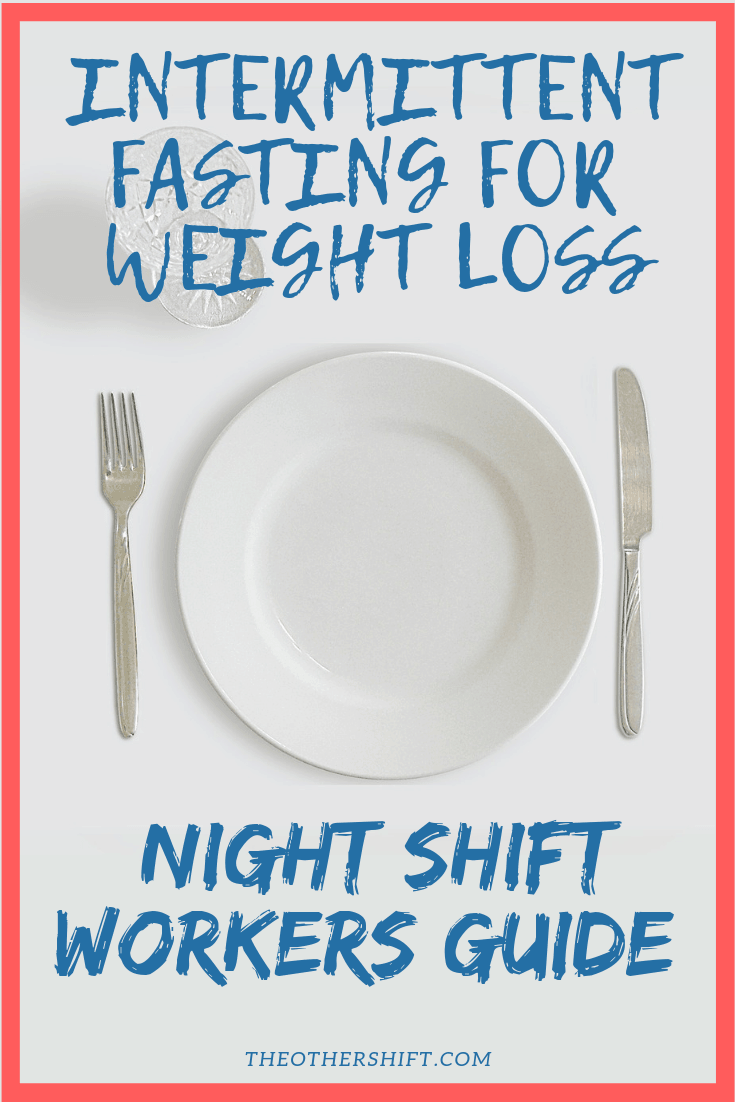
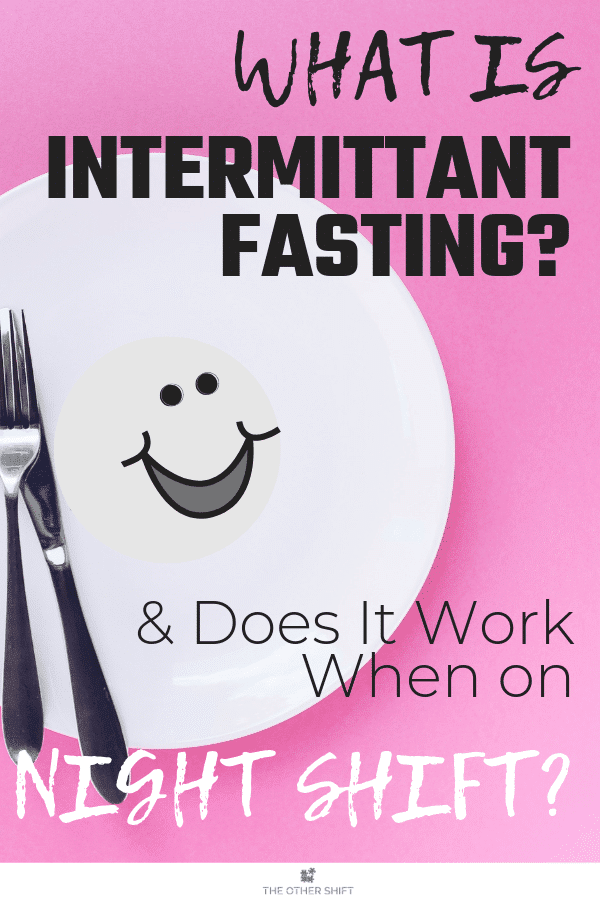
I have been looking for a helpful blog/resource on how night shifters can stay healthy!!! Thank you for this! I have been unhealthy for years and I don’t know how to start a healthy workout routine/diet with my night shift schedule. I am looking forward to learning more. ????????????
Hey Hannah.. We are so glad you’ve found us here! We appreciate the kind words and have no doubt you’ll find information on our website that will help you along your healthy workout / lifestyle journey. If the written content isn’t your thing, you’ll find plenty of videos through our YouTube account too: https://www.youtube.com/channel/UCbNAMvrmiPKfEFfetfnbvXw
Hello! All of your posts/blogs have been so helpful as I just started working overnight (9:30-8) 7 days on and 7 days off as a clinical pharmacist. I am curious how you would recommend adjusting or approaching intermittent fasting times on my off week when I wake up around 7 am and then go to bed at 9 pm (essentially swap/flip back to days.)
Thanks for your help!
I work 8pm to 630 am as the Nightlife Nurse 🙂
I have been making fruit/veggie smoothies for about 2 mths now and having those, as well as adding in some nuts or some cinnamon to spice them up. I find I am really comfortable with those and not too full or bloated which is great.
I chose the 6pm to 2am window to consume the goodies. (hoping I can take my break prior to 2am, my shift is led by the pager to MET/CODES etc. For instance, my break is now and it is 440am!
However, I am in a dilemma on what is my window when I am not working (I only ever work nights), so the flip between nights and normal family days got me confused. (any advise welcome)
I was thinking of midday to 6pm, but that’s a 6hr window.. I think I may be able to handle. Just drink lots of water with lemon in it?
H Em, The Nightlife Nurse Carolyn here 🙂
My night shifts beat 8pm and finish at 630am. So I have chosen my eating window of 6pm to 2am (hoping I get to break before 2am, sometimes codes decide where I might be at that time 🙁
After the last night shift I (as most people seem to do) wake up at about 1pm and try to be ‘normal’ lol.
My question is about what to do with IF times on days off please?
Would it be easier to, on days off, start the eating window at midday but not go past 6pm with food?
Also, My daughter and I have been having fruit/veg smoothies for the past 2mths and we get fresh fruit and veg delivered to our place, whatever is in season. Sometimes we add in nuts or cinnamon to spice things up a bit.
Cheers Carolyn.
Like!! Thank you for publishing this awesome article.
I love this idea but I wonder how to do IF when you’re off days are normal day shift hours? Can you give me any advice?
Hi Marcie,
As a rotating shift worker myself I totally get this question. It can be tricky to find a routine which works so don’t be scared to shift your eating window slightly. If you’re new to IF try having a shorter fasting period to see how you it feels. Baby steps is okay. You may also need to have a day off fasting between nights and days… Keep tweaking your eating window to see what works for you. Emma
Great article, I work 8p to 6am, I never know when to eat, I skip a lot of meals, I am over weight, and just feel crappy all the time, I get home in the morning and go to bed and for some reason I am so cold, I toss and turn, but if I get back up and eat a toast, I feel better and can sleep, so this article has been very helpful.
Hi Kathy.
I’m glad we could help. I find eating a small and warm meal/snack when I get home like oats and a tea (such as chamomile or a sleepy tea blend) takes away the chill. I also make sure I have a warm shower. These two things along with blackening my room and having a pillow/blanket/sheets I love, helps in the sleeping department. You’re doing a great job. Please reach out if you need any further help 🙂 Emma
Thanks for you post. Very informative Nightshift ICU RN here. I’ve been experimenting on/off with IF. I’m struggling with the idea of eating after finishing a shift (8am) right before bed (i.e. breakfast). Is this a myth or something that doesn’t matter as long as you’ve been fasting for the 16 hours ?
Amanda,
Thank you for fighting the good fight and keeping us safe in tough times! When it comes to IF, the general rule is that should you stick to the 16/8 threshold, then you should see results. Having food just before going to sleep however, does present its challenges due to your digestive system also taking a break. If you struggle with sleeping when going to bed hungry, then eating something small and easily digestible at 8am might be your best option. Changing your eating window (8 hour period) could be something to consider too.
Hi so glad I came across your article. Question, I work 10pm to 8am and I’m wanting to try this keto diet along with the IF was wondering if when I start should I start out right away doing the IF everyday during my shift or is the IF just for a few days out of the week? also if you have any other tips I’m definitely interested
Hi Alissa! We are pretty stoked you came across our site too. Good questions. As a female, there are a few things we need to consider when intermittent fasting as our hormones can run a little wild. It is recommended we only IF for a few days a week. This link explains it pretty well. As for doing keto and IF, it may help you ease into ketosis quicker but it’s not absolutely necessary. When doing both at once, some people find fasting on the keto diet is too difficult, “over doing it” during the eating window. However, it is safe to do both at once (1) but just take it easy. Personally, if I was new to both keto and IF I would do one at a time, but that’s just me. Good luck! I hope you get the results you’re after. Oh, one more thing, talking to your doctor about any drastic changes you intend to make regarding your diet may be a clever idea.
Hi, I’m so glad I came across your website. I’m just about to start or at least seriously considering IF and this article is very helpful. I have been on night shift for 7 years and have gained more weight than I should/want. Question, do you need to be on keto diet too on your eating window?
Hi Rosette,
We are so glad you came across our website too. No, you don’t need to eat a keto diet during your eating window. Just try sticking to nutrient-dense foods, like fruits, veggies, whole grains, nuts, beans, seeds, as well as dairy and lean proteins. Raw veggies sticks dipped into hummus and soups I find are really great on night shift. Good luck! Emma
So I’m 2018 I was doing IF with 1000 calories a day per doc. Losing 46lbs in 2 months.
Fast Forward to 2019 I started driving a semi truck on the night shift 2am to 11am and the go in a hotel then at 9pm same night start day out and be back at 430am. So just this past week I decided to go back to IF. Well so far so good. Was just confused on times cause I was doing 2am to 9am. I am thankful I decided to google and came across this site. Now I’m going to try one of the suggested schedules.
Hi Felica! We are glad you did some Googling too! When did you decide to have your eating window? We hope the new (ish) job is working out well for you! Cheers, Em
Hi Laurie,
I also work 7p-7a, and I am interested in starting IF. Do you keep the same eating/ fasting schedule on your days off?
Hi Audrey,
Good question. If you’ve established a solid routine which is working, then sure go for it. Just keep in mind your “weekends” are meant to be a time of relaxation and R&R, so don’t let your fasting/eating routine get in the way of enjoying yourself. But if IF fits into your schedule, go for it. My other thought is women should be very careful doing IF every day as our hormones can go crazy. So because of this, your days off could be a good time for a “break,” but it’s totally up to you. Thanks for your comment and good luck. Cheers, Emma
Great article! Thank you for the information. I work 7 shifts (11 PM – 7 AM) followed by 2 nights off and then another 7 shifts and then 3 nights off. I sleep from 4 PM – 9:45 PM during my work week. How can I fit 16/8 in a doable way in my life? I have a 1.5 year old toddler that I’m a stay-at-home mom for everyday after the end of my shift until my husband comes home and honestly I couldn’t tell you if I’m hungry from being awake 20 hours straight and being on my feet chasing a toddler or if it’s hormones but I’d really love to try intermittent fasting, especially for the health benefits being on midnights.
Night nurse here. I work 7p-7a, 3-4 nights a week. I’ve been doing 16:8 fasting for about a month, and have dropped 10 pounds. My eating window is 4p-midnight, and that seems to be working for me.
Hi Laurie,
Thank you for sharing your story with our community. Sounds like you were already on the right track before finding us, though we hope you gained some invaluable insights from what we’ve shared. Keep up the good work and we’d love to hear how you progress over the coming weeks.
Do you stick with the same window on your days off?
Hi Veronica. If you’ve established a fasting/eating routine which is working for you during your shifts, then go it. However, just remember it’s also important to relax on your “weekend” or on your days off, so don’t let your fasting/eating routine get in the way of enjoying yourself. But if IF fits into your schedule, go for it. The other important thing I should add is your days off could be spent sleeping in and catching up on lost sleep which is really important. So don’t let your eating window get in the way of a solid 7-9 hours sleep. Cheers, Emma
Do you workout as well ?
Hi Tameka. It seems to depend on your fitness and health goals. As a shift worker, I am a big believer in using exercise to clear the mind. Even a stroll around the block in the sun is amazing for your headspace. If you want to do more, just make sure you are eating enough calories (especially fats and protein) during your eating window. Also, depending on your shifts, some recommended eating a small meal or snack anywhere between three hours and 20 minutes before your workout so your body has glycogen ready for fuel. The opinions here vary greatly but yes… working out while fasting is okay. Just listen to your body and adjust what you eat and potentially your eating window if something doesn’t feel right.
Hi Laurie, do you ever feel hungry after midnight at all? Or has your body got used to the pattern?
Also, what is your ‘eating window’ on days off. My main issue is in regards to what eating window to choose on days off when we ‘flip’ back and forth between shifts.
Hey, it’s “Frannie” – LOVE THIS! So much good stuff in here. I’m definitely saving it and going to refer back on some of these concepts. Thanks for all your great content and hard work! 🙂
Hey Frannie!
Thank you! I appreciate your comments very much. I hope you can find a fasting method which works for you while on night shift. When you do try it, let us know how you go! Thanks again. Emma